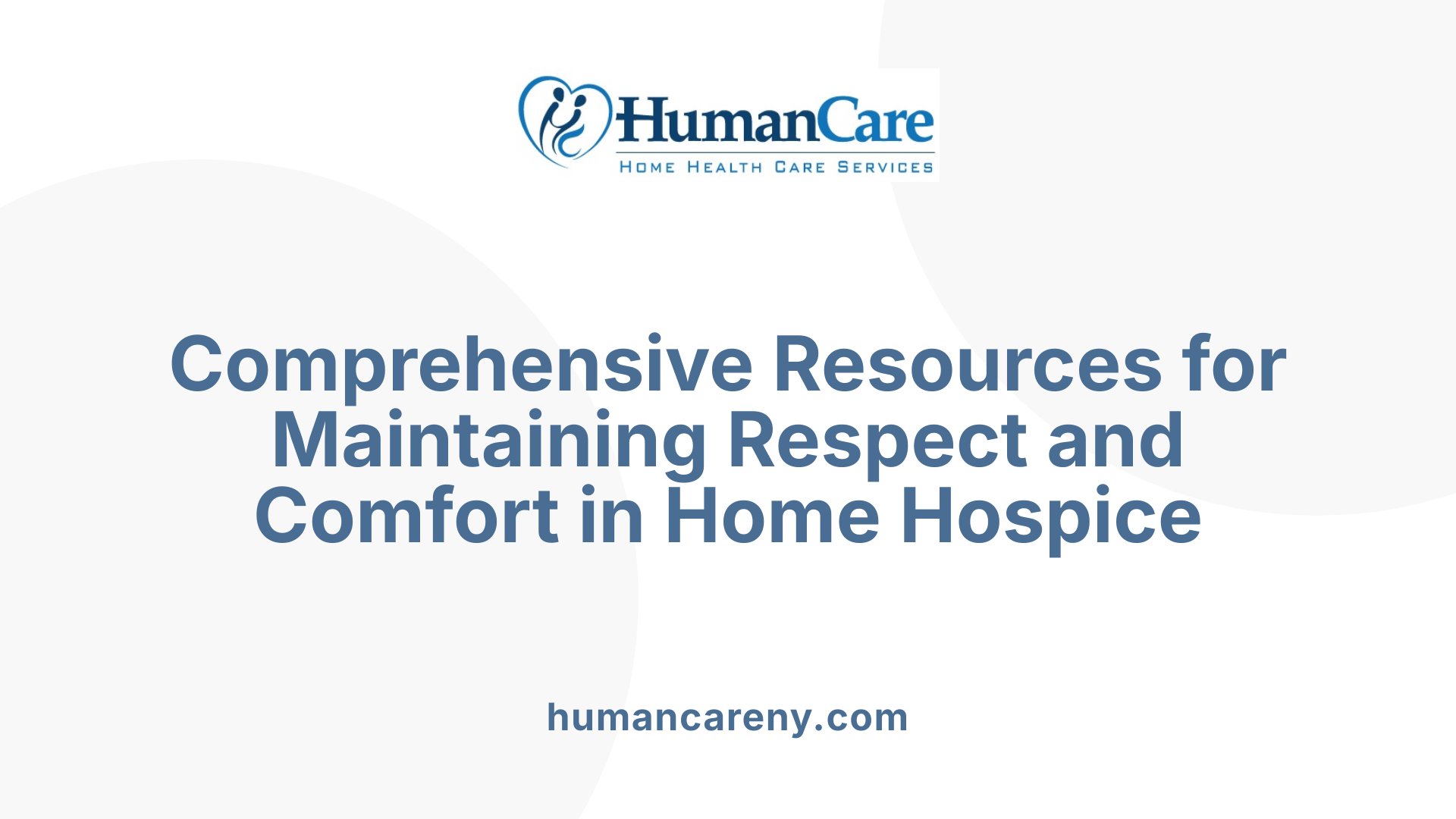Understanding the Importance of Dignity in End-of-Life Care
Dignity at the end of life is a fundamental aspect of compassionate care, ensuring individuals feel valued, respected, and at peace during their final moments. In-home care, including hospice services, plays a crucial role in upholding this dignity by providing tailored support that addresses physical, emotional, spiritual, and social needs in the familiar environment of home. This article explores how in-home care supports end-of-life dignity, the strategies employed, and resources available to patients and families.
The Core Values of Dignity in Home Hospice Care

How does in-home care support dignity at the end of life?
In-home hospice care plays a vital role in upholding dignity by prioritizing respect for personal preferences and individual identity. It allows patients to stay in familiar surroundings, which is often comforting and preserves their sense of autonomy. Care providers tailor their services to meet each person’s unique needs, preferences, and cultural values, ensuring that care decisions reflect the patient’s wishes.
Respectful communication is fundamental in maintaining dignity. Staff focus on engaging with patients and families with kindness, preserving privacy, and encouraging meaningful activities or storytelling that honor the person’s life and personality. This approach supports emotional and spiritual well-being, helping patients feel valued beyond their medical condition.
Balancing professional judgment with patient desires can sometimes require negotiation, especially when care plans involve complex cultural or personal considerations. Nonetheless, the ultimate goal is to empower individuals to make choices about their care, fostering a sense of control and respect.
Physical symptom management—such as controlling pain and ensuring comfort—is treated with sensitivity to preserve bodily dignity. Staff are trained to handle physical changes discreetly and respectfully, acknowledging body image and identity.
Overall, in-home hospice care emphasizes a holistic and personalized approach. It centers on the person's identity, relationships, and preferences—helping ensure their final days are lived with respect, comfort, and dignity.
Supporting Personhood and Cultural Identity

How does in-home care, including hospice services, promote comfort and emotional well-being for patients at the end of life?
Home hospice services significantly contribute to a patient’s comfort and emotional health during end-of-life care. By managing pain and symptoms like breathing difficulty, fatigue, and skin issues, hospice staff reduce physical distress, allowing patients to experience a sense of relief and calm. This symptom control is crucial for maintaining dignity and enabling patients to focus on meaningful moments.
Beyond physical care, emotional and spiritual support play vital roles. Hospice teams are trained to listen actively, offering empathetic presence and facilitating spiritual practices that resonate with individual beliefs. This holistic approach helps patients find peace and a sense of purpose during their final days.
Being cared for at home provides familiarity, which is key to preserving a patient's sense of autonomy and independence. Personal preferences and values guide the care plan, ensuring that treatment feels natural and respectful of the person’s identity.
A multidisciplinary team—including nurses, social workers, chaplains, and volunteers—works together to address psychosocial needs. They provide grief counseling, emotional reassurance, and practical assistance, helping patients feel supported and less isolated.
Overall, in-home hospice fosters a safe, comfortable environment that respects individual dignity, promotes emotional well-being, and enhances the quality of life during the final phase.
Principles and Strategies for Preserving Dignity in Home Hospice

What are the key principles and strategies for preserving dignity in home hospice settings?
Preserving dignity in home hospice care centers on respecting each patient's autonomy, individuality, and personal wishes. This means honoring their preferences around care, relationships, and coping strategies, regardless of age or health status.
Effective communication is fundamental. Staff and caregivers should engage with patients compassionately, listening attentively and conveying empathy. Open dialogue helps patients feel heard and understood, reinforcing their sense of control and self-worth.
Managing physical symptoms is also crucial. Appropriate pain relief and symptom management alleviate suffering, which directly supports bodily dignity. Practices such as gentle handling, respecting privacy during personal care, and sensitive attention to physical changes uphold patients’ bodily integrity.
Involving patients in decision-making processes ensures they retain a sense of agency. This includes discussing care options, respecting their choices, and honoring their cultural and spiritual needs. Sometimes, negotiations and creative solutions are necessary to balance professional judgment with individual wishes.
Holistic approaches go beyond physical care. Spiritual support, life storytelling, and reflection, often facilitated through dignity therapy, help patients find meaning and reinforce their sense of self. These activities support emotional well-being and allow patients to share their legacies.
Creating a supportive environment in the home is also essential. Simple comforts, privacy, and cultural sensitivity contribute to a sense of safety and respect. Supporting the emotional, social, and spiritual needs of both patients and their families fosters a dignified experience.
Ultimately, the goal is to see each person as a whole individual. Celebrating their life, respecting their preferences, and providing compassionate, tailored care help preserve their dignity during this vulnerable time.
Resources and Options to Uphold Dignity During End-of-Life

What resources and options are available through in-home care to uphold patient dignity during end-of-life stages?
In-home care plays a vital role in preserving a patient’s dignity during the final stages of life. One of the primary resources is a team of trained hospice and home health providers who focus on managing symptoms and ensuring comfort. These professionals employ medications, relaxation techniques, massage, and music therapy to control pain and physical distress.
Beyond physical care, emotional and spiritual support services are crucial. Social workers, chaplains, and counselors help address mental health concerns, spiritual needs, and provide peace of mind. They guide patients through reflection, life review, and connecting with personal values, fostering a sense of worth and meaning.
Practical assistance includes adapted equipment and hands-on care like bathing, dressing, and grooming, which helps maintain independence and personal dignity. Providing these services allows patients to retain control over their routines as much as possible.
Personalized care planning ensures that the patient's preferences, cultural identity, and individual values are prioritized. Open dialogue about care goals, life story, and end-of-life wishes helps uphold autonomy.
Legal and communication resources are fundamental. Advance directives and living wills document patient wishes and guide care, reinforcing respect for their autonomy. Clear legal planning prevents unwanted interventions and ensures preferences are honored.
Supporting family caregivers is an essential part of in-home resources. Respite care, education, and emotional support for families help reduce burnout and enable them to provide consistent, compassionate care.
Altogether, these resources create a comprehensive support system that sustains physical comfort, emotional stability, and personal dignity, making the end-of-life stage more peaceful and meaningful.
| Resource Type | Description | Benefits |
|---|---|---|
| Medical care | Symptom management, medications, therapies | Physical comfort and pain relief |
| Emotional & spiritual support | Counseling, chaplains, social work | Peace, acceptance, emotional well-being |
| Practical assistance | Personal care, adaptive equipment | Independence, dignity |
| Legal resources | Advance directives, legal planning | Respect for wishes, autonomy |
| Family support | Respite, education | Caregiver well-being, continuity |
These options collectively help to honor the patient’s dignity, ensuring they can live their final days with respect, comfort, and in accordance with their personal values.
The Significance of Dignity in End-of-Life Care
Why is dignity important in end-of-life care, and how can it be supported at home?
Dignity holds a central place in end-of-life care because it affirms the individual's worth, respects their personal identity, and promotes a sense of control during a vulnerable time. It helps patients feel valued as persons, not just as medical cases, fostering emotional comfort and respect.
Supporting dignity at home involves multiple thoughtful practices. Communication should be respectful, empathetic, and aligned with the patient’s preferences, allowing them to express their wishes about care and relationships. Creating a peaceful, private environment helps enhance comfort and safeguards privacy, which is vital for maintaining bodily dignity.
Personal care activities like assisting with grooming and managing physical changes with sensitivity are essential. Recognizing and respecting cultural identities and body image uphold the person's sense of personhood beyond their illness.
Encouraging meaningful activities—such as sharing life stories or connecting with loved ones—can reinforce the individual’s sense of purpose. Emotional and spiritual needs must also be acknowledged and addressed, either directly or through the support of hospice team members.
Practical measures, including respecting care choices and supporting autonomy, play a significant role. For example, honoring advance directives ensures that individual preferences continue to guide care decisions.
Overall, a holistic approach that combines physical comfort with emotional, spiritual, and personal support fosters dignity. This approach not only alleviates physical distress but also nurtures the person’s identity and sense of self during their final moments, ensuring a respectful and meaningful end-of-life experience at home.
Upholding Dignity Through Compassionate Support
In-home care plays a vital role in ensuring that individuals nearing the end of life retain their dignity through personalized, respectful, and holistic approaches. By honoring personal preferences, managing symptoms effectively, and providing emotional and spiritual support within the comfort of home, caregivers can help patients experience their final days with peace, respect, and a sense of self-worth. Maintaining dignity is not only a professional responsibility but also a moral imperative that transforms end-of-life experiences into moments of meaningful connection and profound respect.
References
- End-of-life dignity in Home Hospice: Insights from staff ...
- Dignity in End-of-Life Care & Hospice Care
- What Is End of Life Care in a Home Care Setting?
- How Hospice Care Offers Remarkable Comfort and Dignity ...
- Hospice Care Maintains Dignity for Patients at the End of Life
- CaringInfo: Resources for Serious Illness & End-of-Life Care
- Hospice Foundation of America: Home



